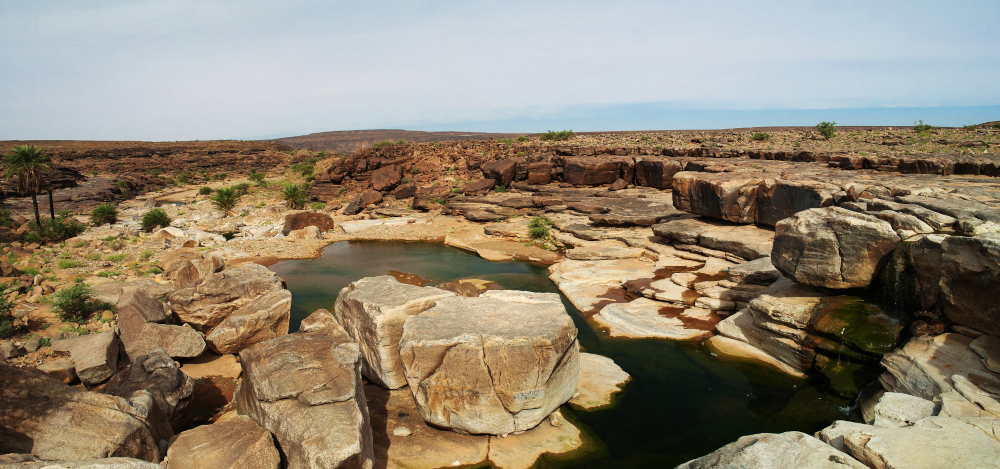In the dry rural settlements of the north-western Islamic Republic of Mauritania, women and children walk long distances to fetch water from muddy wells, consuming the hard-won liquid sparingly between drinking and cooking. Washing hands after visiting the bush or latrine is a luxury, and boiling the dirty water uses precious fuel. Mothers know that children could fall ill, but often they have little choice.
Over half the land in Mauritania is sparsely populated desert. Its gross domestic product is one of the lowest in Africa, despite plentiful natural resources such as iron ore, gold, and natural gas. Lacking storage or irrigation infrastructure, agriculture is vulnerable to the changing climate. In recent years, increasingly extreme and frequent droughts have driven traditional nomads to migrate from rural areas to urban centres. Inequalities in access to water, sanitation, and hygiene (WASH) services between urban and rural populations, and between rich and poor, have grown. As a major social consequence, diarrheal diseases are the second-highest cause of infant death in the country.
How much is available, and where?
The government does not have the right data to plan appropriate interventions for storing water, treating water, transferring and supplying water to populations and farmers, and providing toilets, drainage, and wastewater management. Addressing data deficiencies is a first step to answering the kinds of questions that stand in the way of action.
What water resources are available in each region of Mauritania? How large are the water withdrawals, and what are the sources? What are the water needs per sector (agriculture, livestock, industry, domestic use) and by region? How many people don’t have access to safe drinking water and to latrines? How far are the nearest standpipes from areas of resettlement?
A collaborative response
Aware of the need to help build Mauritania’s capacity to answer questions like these, in 2017 GWP Mediterranean, through WACDEP and supported by the country’s National Water Resources Centre, began to develop an action plan for a monitoring and evaluation (M&E) system that would provide the needed data. This would be built for the context of climate change, when precipitation patterns are changing and droughts are becoming more frequent and extreme. GWP Mediterranean had help in the form of a system of indicators being developed by the African Ministers’ Council on Water (AMCOW) in response to the UN Sustainable Development Goal for water.
Meanwhile, UNICEF had been supporting the Planning, Monitoring, and Cooperation Department at the national Ministry of Hydraulics and Sanitation to elaborate an action plan for an M&E system for WASH. The WACDEP project team recognised an opportunity and approached UNICEF with a suggestion to join forces and merge the two action plans. Working together, the partners produced a 10-year M&E Action Plan covering the years 2018–2027, including costs of outlined activities. The M&E Action Plan included investments needed for both infrastructure in the form of hardware and measuring devices, and for steps to improve the governance framework that would reinforce stakeholders’ capacity to maintain the system.
A national workshop in February 2018 brought together key stakeholders representing the different technical departments of the Ministry of Hydraulics and Sanitation, water utilities, the Ministry of Agriculture, and the Ministry of Environment and validated the plan.
Finding resources
Finding financial resources to implement the M&E Action Plan was the next step. In April 2018, Mauritania joined its sister states in the Arab Maghreb Union and Group of Five for the Sahel at a regional conference organised through WACDEP, to consolidate the countries’ knowledge of approaches for assessing impacts and vulnerabilities to climate change. There, the participants prioritised adaptation actions, shared experiences and good practices in the design and implementation of co-benefits from water projects, and accessed information about funding opportunities to support implementation of the countries’ Nationally Determined Contributions and the Sustainable Development Goals.
Discussions during the conference guided Mauritania to approach the Green Climate Fund (GCF) to support the implementation of the M&E Action Plan; an adaptive water supply project in the priority Adrar area in the north of Mauritania was determined to be the first potential project. The Ministry of Hydraulics and Sanitation, with the support of GWP-MED, began preparing a funding request to submit to the GCF in 2019.
Duplication of effort in development aid projects wastes resources, while complementary and collaborative activities accelerate development. In the case of Mauritania’s national water and sanitation policy and planning, GWP Mediterranean’s experience in mobilising partnerships enabled the WACDEP initiative to take a coordinated approach that strengthened the argument for an integrated M&E system and for an improved process to put it in place.
From knowledge to services
Mauritania’s traditional partners have been successfully mobilised to contribute to implementation of the M&E Action Plan, resulting, so far, in UNICEF support for WASH service monitoring in two pilot areas in the south of Mauritania and in the World Bank providing US$3.5 million for water resources monitoring.
Furthermore, Mauritania’s Country Programme submission to the GCF included the water adaptation project in Adrar as a priority. The preparation of the funding request is advancing. The influence of the country’s M&E Action Plan, meanwhile, has already shifted priorities for the country’s decision-makers; it has opened doors to investing in effective management of Mauritania’s water resources and in the health of its people.
Photo: Rocky pond on Adrar Plateau, Mauritania, by Mostphotos.com/Sergey Mayorov

